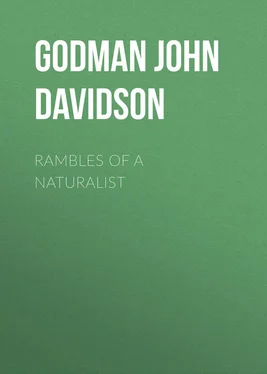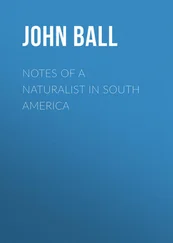John Godman - Rambles of a Naturalist
Здесь есть возможность читать онлайн «John Godman - Rambles of a Naturalist» — ознакомительный отрывок электронной книги совершенно бесплатно, а после прочтения отрывка купить полную версию. В некоторых случаях можно слушать аудио, скачать через торрент в формате fb2 и присутствует краткое содержание. Жанр: История, foreign_antique, foreign_prose, на английском языке. Описание произведения, (предисловие) а так же отзывы посетителей доступны на портале библиотеки ЛибКат.
- Название:Rambles of a Naturalist
- Автор:
- Жанр:
- Год:неизвестен
- ISBN:нет данных
- Рейтинг книги:4 / 5. Голосов: 1
-
Избранное:Добавить в избранное
- Отзывы:
-
Ваша оценка:
- 80
- 1
- 2
- 3
- 4
- 5
Rambles of a Naturalist: краткое содержание, описание и аннотация
Предлагаем к чтению аннотацию, описание, краткое содержание или предисловие (зависит от того, что написал сам автор книги «Rambles of a Naturalist»). Если вы не нашли необходимую информацию о книге — напишите в комментариях, мы постараемся отыскать её.
Rambles of a Naturalist — читать онлайн ознакомительный отрывок
Ниже представлен текст книги, разбитый по страницам. Система сохранения места последней прочитанной страницы, позволяет с удобством читать онлайн бесплатно книгу «Rambles of a Naturalist», без необходимости каждый раз заново искать на чём Вы остановились. Поставьте закладку, и сможете в любой момент перейти на страницу, на которой закончили чтение.
Интервал:
Закладка:
Dr. Godman's views of the authenticity and practical tendency of the gospel, are expressed with singular force and beauty in the following extract from an essay written not long before his death:
"Is proof wanting that these gospels are true? It is only necessary for an honest mind to read them candidly, to be convinced. Every occurrence is stated clearly, simply, and unostentatiously. The narrations are not supported by asseverations of their truth, nor by parade of witnesses: the circumstances described took place in presence of vast multitudes, and are told in that downright, unpretending manner which would have called forth innumerable positive contradictions had they been untrue. Mysteries are stated without attempt at explanation, because explanation is not necessary to establish the existence of facts, however mysterious. Miracles, also, attested by the presence of vast numbers, are stated in the plainest language of narration, in which the slightest working of imagination cannot be traced. This very simplicity, this unaffected sincerity, and quiet affirmation, have more force than a thousand witnesses – more efficacy than volumes of ambitious effort to support truth by dint of argumentation.
What motive could the evangelists have to falsify? The Christian kingdom is not of this world , nor in it . Christianity teaches disregard of its vanities, depreciates its honours and enjoyments, and sternly declares that none can be Christians but those who escape from its vices and allurements. There is no call directed to ambition, no gratification proposed to vanity: the sacrifice of self, the denial of all the propensities which relate to the gratification of passion or pride, with the most humble dependence upon God, are invariably taught and most solemnly enjoined, under penalty of the most awful consequences. Is it, then, wonderful that such a system should find revilers? Is it surprising that sceptics should abound, when the slightest allowance of belief would force them to condemn all their actions? Or is it to be wondered at that a purity of life and conversation so repugnant to human passion, and a humility so offensive to human pride, should be opposed, rejected, and contemned? Such is the true secret of the opposition to religion – such the cause inducing men who lead unchristian lives, to array the frailties, errors, weaknesses, and vices of individuals or sects, against Christianity , hoping to weaken or destroy the system by rendering ridiculous or contemptible those who profess to be governed by its influence, though their conduct shows them to be acting under an opposite spirit.
What is the mode in which this most extraordinary doctrine of Christianity is to be diffused? By force, temporal power, temporal rewards, earthly triumphs? None of these. By earnest persuasion, gentle entreaty, brotherly monition, paternal remonstrance. The dread resort of threatened punishment comes last; exhibited in sorrow, not in anger; told as a fearful truth, not denounced with vindictive exultation; while to the last moment the beamy shield of mercy is ready to be interposed for the saving of the endangered.
Human doctrines are wavering and mutable; the doctrines of the blessed and adorable Jesus, our Saviour, are fixed and immutable. The traditions of men are dissimilar and inconsistent; the declarations of the gospel are harmonious, not only with each other, but with the acknowledged attributes of the Deity, and the well-known condition of human nature.
What do sceptics propose to give us in exchange for this system of Christianity, with its 'hidden mysteries,' 'miracles,' 'signs and wonders?' Doubt, confusion, obscurity, annihilation! Life, without higher motive than selfishness; death, without hope! Is it for this that their zeal is so warmly displayed in proselyting? Is such the gain to accrue for the relinquishment of our souls? In very deed, this is the utmost they have to propose; and we can only account for their rancorous efforts to render others like themselves, by reflecting that misery loves company."
His intellect was strong and undimmed to the last, and almost the only change that could be observed in his mind was that which belongs to a being on the verge, of eternity, in whose estimate the concerns of this life are sinking in comparison with the greater interests of that to which he is approaching. His principal delight was in the promises and consolations of the Bible, which was his constant companion. On one occasion, a few days before his death, while reading aloud from the New Testament to his family, his voice faltered, and he was desired to read no longer, as it appeared to oppress him. "It is not that," replied he; "but I feel so in the immediate presence of my Maker, that I cannot control my emotion!" In a manuscript volume which he sent to a friend, and which he intended to fill with original pieces of his own composition, he wrote as follows: "Did I not in all things feel most thoroughly convinced that the overruling of our plans by an all-wise Providence is always for good, I might regret that a part of my plan cannot be executed. This was to relate a few curious incidents from among the events of my most singularly guided life, which, in addition to mere novelty or peculiarity of character, could not have failed practically to illustrate the importance of inculcating correct religious and moral principles, and imbuing the mind therewith from the very earliest dawn of intellect, from the very moment that the utter imbecility of infancy begins to disappear. May His holy will be done, who can raise up abler advocates to support the truth." "This is my first attempt to write in my Token; why may it not be the last? Oh! should it be, believe me, that the will of God will be most acceptable. Notwithstanding the life of neglect, sinfulness, and perversion of heart which I so long led, before it pleased Him to dash all my idols in the dust, I feel a humble hope in the boundless mercy of our blessed Lord and Saviour, who alone can save the soul from merited condemnation. May it be in the power of those who chance to read these lines, to say, Into thy hands I commit my spirit, for Thou hast redeemed me, O Lord! thou God of Truth!"
A reliance on the mercies of God through Jesus Christ became indeed the habitual frame of his mind, and imparted to the closing scenes of his life a solemnity and a calmness, a sweet serenity and a holy resignation, which robbed death of its sting and the grave of its victory. The following extracts from some of his letters afford additional evidence of the great and glorious change which he had been permitted to experience.
"Philadelphia, Feb. 17th, 1829."My dear Friend, – Since my last to you my health has suffered various and most afflicting changes." – "But thanks to the mercies of Him who is alone able to save, the valley and shadow of death were stripped of their terrors, and the descent to the grave was smoothed before me. Relying on the mercies and infinite merits of the Saviour, had it pleased God to call me then, I believe I should have died in a peaceful, humble confidence. But I have been restored to a state of comparative health, perhaps nearly to the condition in which I was when I wrote to Dr. Judson; and I am again allowed to think of the education of my children and the support of my family."
In reply to a letter from Professor Sewall, giving an account of the last moments of his friend Dr. Judson, he responds in the following feeling manner:
"Germantown, May 21st, 1829.My dear Friend, – I feel very grateful for your attention in sending me an account of our dear Judson's last moments. After all his doubts, difficulties, and mental conflicts, to know that the Father of mercies was pleased to open his eyes to the truth, and shed abroad in his heart the love and, salvation offered through the Redeemer, is to me a source of the purest gratification, and a cause of the most sincere rejoicing. The bare possibility of my having been even slightly instrumental in effecting the blessed change of mind he experienced, excites in me emotions of gratitude to the Source of all good which words cannot express." – "My health has been in a very poor condition since my last to you. The warm weather now appears to have set in, and possibly I may improve a little, otherwise it will not be long before I follow our lately departed friend. Let me participate in the prayers you offer for the sick and afflicted, and may God grant me strength to die to His honour and glory, in the hopes and constancy derived from the merits and atonement of the blessed Saviour."
Читать дальшеИнтервал:
Закладка:
Похожие книги на «Rambles of a Naturalist»
Представляем Вашему вниманию похожие книги на «Rambles of a Naturalist» списком для выбора. Мы отобрали схожую по названию и смыслу литературу в надежде предоставить читателям больше вариантов отыскать новые, интересные, ещё непрочитанные произведения.
Обсуждение, отзывы о книге «Rambles of a Naturalist» и просто собственные мнения читателей. Оставьте ваши комментарии, напишите, что Вы думаете о произведении, его смысле или главных героях. Укажите что конкретно понравилось, а что нет, и почему Вы так считаете.












